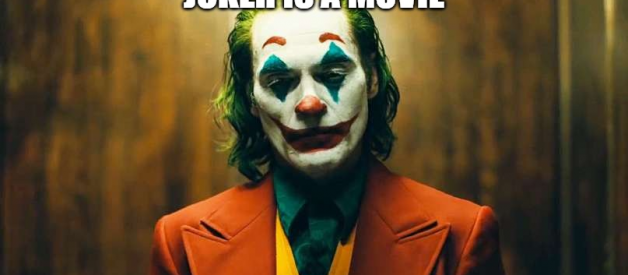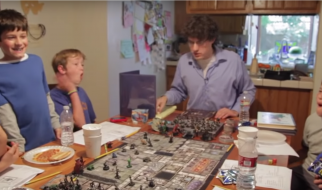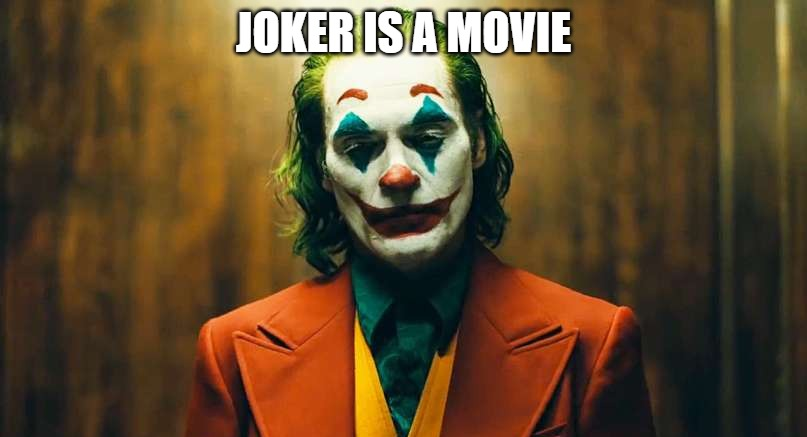
Sometime late 2017 or early 2018 a cropped image of Bugs Bunny began circulating, its top text reading ?we live in a society? and its bottom text just out of frame, lost in the aether. The image, through an all too familiar moment of ironic reclamation took on a new meaning, the absence of what defines our society itself became a comment, on media and criticism acknowledging the presence of societal trends while either unable or refusing to define what they are. Lists were compiled, memes were made and however niche, the term was canonised.
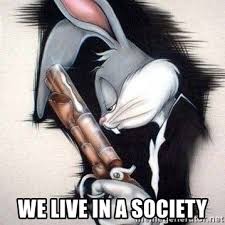
At the same time, the Joker, a character too big to ever sink into irrelevance was undergoing a transformation. Joker?s last appearance being in the near universally panned Suicide Squad along with the character?s general association with unsavory angry nerd types meant that while the companies that owned him grappled to redefine the character, on a smaller level new connections were being made. The cruel detachment that captured minds in 2008 faded as the people who had grown up with it and a million cheap impressions started to question exactly what they?d thought was so cool the first time round and a generation too young to have connected with the character then grew into a world without the all important context of what was cool in 2008. Slowly but surely, the Joker became a joke.
And then, as memes on the internet are wont to do, the two collided. At some point The Joker and Society became inseparable, Todd Phillips? Joker entered production and the world waited with bated breath.
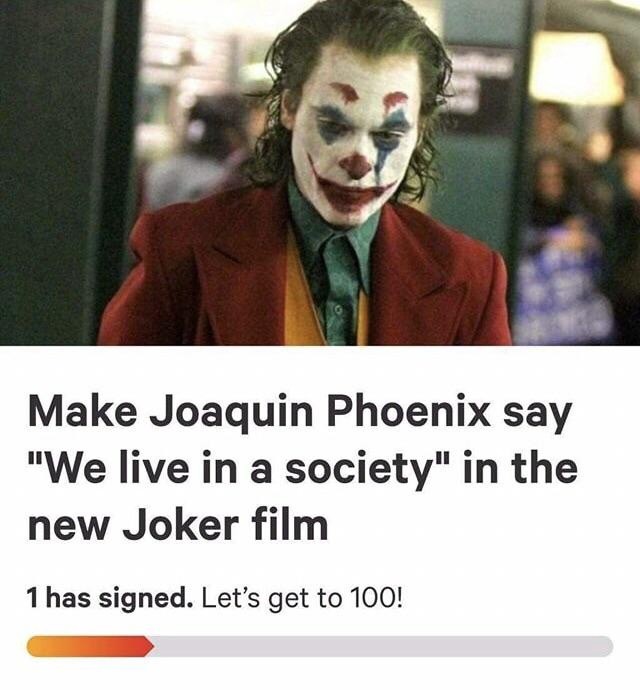
Leading up to its release, the film was met with large scale criticism and larger scale jokes about the dangerous potential of its message. That the decision to frame an angry white man?s violence at a world he feels mistreated by as anything but irrational and unnecessary in the present day, especially considering the character?s fans is a mistake and not a movie we need right now that could at worst lead to real world violence.
Joker opened August 31st at the Venice film festival to rave reviews and then shortly after at TIFF to a far less enthused reaction. It?s on track to make a lot of money and probably get at least some Oscar nominations. It?s also the topic of just a little bit of discourse.
I watched Joker this afternoon and I really wish I had any other takeaway than that this movie is massively stupid. Its cast and crew?s ill-preparedness to address concerns around its message is no longer surprising once you realise the film is so confused about what its own message is that they probably didn?t even consider it. Joker isn?t dangerous because of what it says, it?s dangerously irresponsible in what it doesn?t know it?s saying. It makes explicit gestures at real world politics and cultural fears but those gestures are mostly a flailing middle finger.
The character of Arthur Fleck is at once a mentally ill loner abused by society and a mentally ill sociopath who is a danger to society. His medication and therapy being cut due to economic strife is a tragedy but it directly causes him to commit the same violence we?re expected to condemn as if our sympathy for people with mental illnesses was somehow misplaced. Arthur Fleck is keenly aware of how the people on top with the money and the power have abandoned and hurt the lower classes but once his own violence sparks genuine class based revolution he is apolitical, the political affiliation of his followers little more than window dressing because presumably Todd ? how easily the far left can sound like the far right? Phillips is more inconvenienced by the latter. Arthur can?t join the protests because he doesn?t want to see the world burn, he wants to join them on the top which is a far cry from the ?I don?t believe in anything? anarchy the film pays lip-service to.
In general the film’s political theming is so poorly thought out that it almost feels intentionally so. Early on, Arthur Fleck kills three WASPy Wall Street guys, becoming a hero and acting as the tipping point for all out class warfare in the streets. This decision very clearly and permanently defines the political framework the movie takes place in. Rich people are bad but they are people whereas protesters are a violent mass of opportunism and violence willing to look to a clown for guidance. A noticeably entirely white male mass in comparison to the real world movements it is based on, a choice that either speaks to a deep misunderstanding of the motivations of actual antifascist movements or an attempt to, with seemingly zero awareness of why recall images of real world fascism depending on how stupid you believe Todd Phillips is. The fact that the first victims of Joker’s violence are representative so explicitly of the systems the film invokes but refuses to condemn is the perfect microcosm of how deeply scared the film is to say anything about the ideas it brushes past.
The closest thing the film has to an antagonist is Thomas Wayne, a spineless Trump analogue with all the critical value of Alec Baldwin (the first choice for the role) still dragging outtheSNLimpression. He?s an old money businessman running for mayor with the promise of cleaning up Gotham and that?s about where the film stops with his character. His main role is as the #1 target of the film?s genuinely cartoonish ?kill the rich? protests, the relative humanity with which he?s framed in comparison to them only furthering the film?s uncomfortable relationship with its ?political? commentary. The other plot thread revolving around this character involves a woman who accuses Wayne (Trump) of having slept with her some 30 years ago, the response to which is a swift assertion that she is mentally unwell. This ends up being the truth the film presents us and while I understand story comes first and this revelation has greater repercussions on the narrative, it feels like a specifically irresponsible choice to not only invoke reactions to Trump?s own accusers but to, within the world of this story validate that reaction. Martha Wayne does not have a single line of dialogue. On some level seeing Bruce Wayne as a child in someone else?s story is cool but it?s a perfect example of the film?s willingness to pull from the source material it so happily liberates itself from for a lot of the runtime when a beat needs a layer of fan-service to actually work.
In general Joker has a pretty infuriating relationship with adaptation, though Todd Phillips has insisted otherwise, the film being based on the clown from DC comics is absolutely instrumental to any weight it has as drama or as entertainment. That said, the film still holds itself higher than the text that inspired it. The first example to really get to me was that Arthur Fleck has a neurological condition that makes him laugh uncontrollably in random situations. This is a real condition that I?m sure is not fun for people who suffer with it but the film?s invocation of it is not out of respect for those people but disdain for the relative levity of the source material. Joker can?t just laugh because he finds things funny because that intangible link of explanation would be too fantastical and not rational enough for a Smart Grown-up Movie like Joker. This creates a weird redundancy in the film because the Joker?s view that his life is a comedy is either based on his problem with laughing or his aspirations of being a standup but because we really don?t know it just feels like an oversight caused by the film trying to outsmart itself. Without spoiling anything this also applies to the entire climax of the film and while a film expecting you to have some wider contextual knowledge is not inherently a flaw, when you?re also aware of the disdain the film itself has for that knowledge it all just feels a little pointless. It also just really makes me wish there was a Batman already around somewhere.
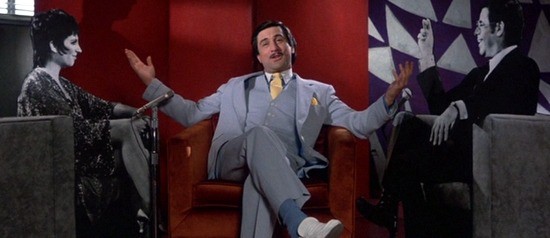 Robert De Niro in The King of Comedy in a scene that is ?paid homage to? near the end of Joker
Robert De Niro in The King of Comedy in a scene that is ?paid homage to? near the end of Joker
On the topic of things the film wishes you would forget, from about the first image of the film released, comparisons were made, and in some cases invited to Martin Scorsese?s Taxi Driver and King of Comedy, two films released in the late 70s/early 80s featuring Robert De Niro as a down on his luck loner who uses violence to force the world to hear him out and if you?ve seen these movies it is impossible not to draw comparisons to Joker. The film simultaneously begs for validation of its place in Cinema and hopes to god you don?t walk out thinking everything was a little too familiar but structurally and stylistically it lifts so much from those movies that it feels dishonest that they?re not credited as highly as the comics. The aesthetic of serious drama is lazily pasted onto a movie that has more in common with every comic book movie it thinks it?s better than. Its cinematography and melodramatic performances will no doubt receive enormous praise and on that level maybe they worked but this approach to artistry as something that can be turned on or off speaks massively to the general tiring cynicism that defines the film. I am sure plenty of people will come out of this film having enjoyed it but from its opening moments I couldn?t get over its lazy smugness.
Joker is a movie about how something is wrong and how someone needs to fix it that absolutely refuses to fill in those gaps itself. Its commentary on mental health and class and politics are not themes or ideas, they are invocations of those serious, contentious topics with the assumption that the viewer will do the heavy lifting. It is so scared of saying anything conclusive on its own that functionally it tells you exactly what you want it to. Joker isn?t dangerous because it acts as some extravagant incel call to arms, Joker is dangerous because if you want to believe it?s on your side, that Arthur Fleck?s turn to crime is justified and admirable, it doesn?t have the guts to tell you otherwise.
Everything about Joker is a half measure, a compromise, a meme of Bugs Bunny with the bottom half cut off. Poor people are mistreated so we need to-, mental health support is underfunded so we should-, rich people are mean so we should-,
we live in a society-.
